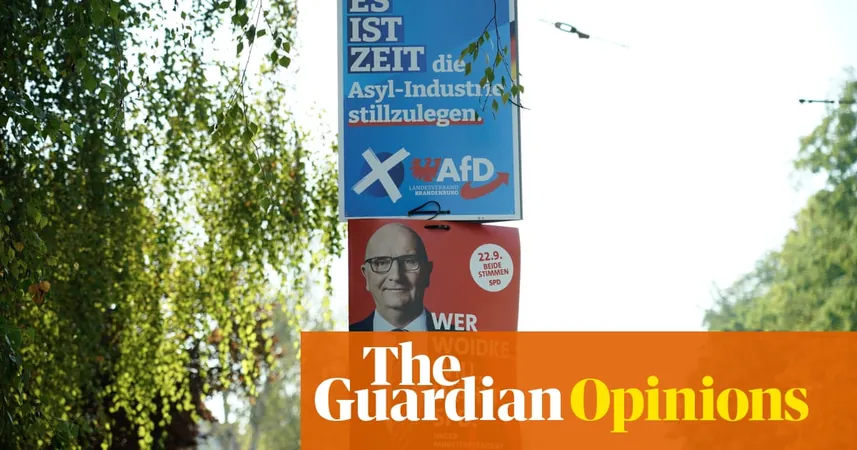
A Narrow Escape from the Far-Right: Lessons from Brandenburg's Election
2024-09-24
On a bright, unusually warm autumn Sunday, I set out to vote in Brandenburg. Unlike the usual quick walk to my polling station, this time I faced an 8km drive due to a shortage of poll clerks. The crumbling rural roads tested my patience, as the faded asphalt gave way to stubborn remnants of Prussian cobblestones.
Upon arrival, three clerks greeted me: a middle-aged woman, a solidly built older man, and a young man sporting a stark military cut. As I took my voting slip, I couldn’t help but feel a strange mix of emotions about democracy’s frailty. Here I stood, ready to cast my vote for a party they likely deemed controversial, knowing that statistically, two of them would favor the far-right Alternative for Germany (AfD). Our local parish had previously delivered over 50% support for this far-right party, reflecting a disturbing trend visible in the recent European elections. Yet, thankfully, my voting experience was free from intimidation or hostility.
As the election results came in that evening, a wave of relief washed over me. The social democrats (SPD) clinched a narrow victory, securing 30.9% against the AfD's 29.2%. This win was not directly attributed to Chancellor Olaf Scholz, who largely stayed out of the campaign. In Brandenburg, the longstanding popularity of Governor Dietmar Woidke and his strategy to dissociate from the national narrative proved decisive. Critics like Alice Weidel of the AfD claimed their loss was due to tactical voting, but the reality was clear: they had lost.
Still, as the AfD’s main candidate, Hans-Christoph Berndt, defiantly predicted a “blue” future for the party, we cannot ignore the troubling reality of authoritarian populism's rise. The AfD has increased its support by about 6% since the last Brandenburg election and emerged as a leading party among younger voters.
To grasp the rightward shift in Brandenburg and other post-socialist regions, one must consider both global and local contexts. Contrary to popular belief, this isn't simply a case of East Germans lacking democratic experience; rather, a broader global trend sees similar shifts in established democracies like the US and France. Philipp Ther, a Vienna-based historian, refers to this phenomenon as “the other end of history,” citing the pervasive marginalization resulting from unrestricted neoliberal policies enacted after the fall of the Iron Curtain. This has deeply affected both rural and industrially abandoned areas across Europe, especially in the former East Germany, where 80% of East Germans found themselves unemployed after reunification, leading to a lingering memory of economic dispossession.
Even as some economic growth appears in Brandenburg, often spurred by multinational companies such as Tesla, the jobs created tend to be precarious and often lack union representation, leaving many feeling vulnerable and disenfranchised.
The bitterness stemming from the pandemic's restrictive measures has further complicated feelings of autonomy and freedom, turning angry protests into fertile ground for far-right rhetoric. The AfD capitalizes on such sentiments by offering a false sense of control, advocating white supremacy and ethnic homogeneity, which many find paralyzing against the backdrop of stark socio-economic inequality. Remarkably, some supporters express a desire for the state to intervene against wealth disparity, yet they perceive this as unattainable, yearning instead for an exclusionary nationalism.
After voting, I had a brief chat with one of the older clerks, revealing that we had worked together ten years prior to renovate a friend’s roof. This shared experience sparked reflections on how crucial interpersonal connections are in bridging divides. I often advise others from urban settings on how to engage with opposing views: direct dialogue is only achievable when rooted in cooperative experiences.
While my navigation got teased at the polling station, those small moments of shared humanity hinted at the potential pathways to unity. It's clear that we still face daunting challenges in fostering mutual respect and understanding within society. However, my interactions that day reaffirmed my conviction that such engagements are essential to steering our future away from the abyss of fascism.
As we navigate our complex political landscape, we must remain vigilant and address the underlying issues driving the shift to the right. It’s not merely about winning elections but about reshaping the societal fabric that holds us together. The lessons from this election in Brandenburg are far-reaching; we must keep struggling for a democratic and inclusive future where all voices are heard, and the fabric that binds us is stronger than the divisions that seek to tear us apart.


 Brasil (PT)
Brasil (PT)
 Canada (EN)
Canada (EN)
 Chile (ES)
Chile (ES)
 España (ES)
España (ES)
 France (FR)
France (FR)
 Hong Kong (EN)
Hong Kong (EN)
 Italia (IT)
Italia (IT)
 日本 (JA)
日本 (JA)
 Magyarország (HU)
Magyarország (HU)
 Norge (NO)
Norge (NO)
 Polska (PL)
Polska (PL)
 Schweiz (DE)
Schweiz (DE)
 Singapore (EN)
Singapore (EN)
 Sverige (SV)
Sverige (SV)
 Suomi (FI)
Suomi (FI)
 Türkiye (TR)
Türkiye (TR)